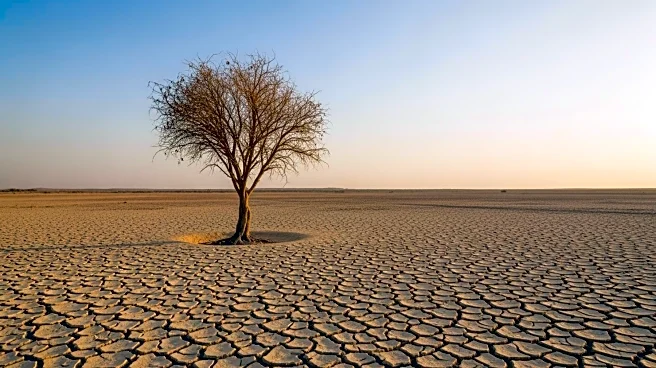What's Happening?
A recent study published in Nature Communications by researchers from the IBS Center for Climate Physics at Pusan National University highlights the increasing risk of multi-year droughts due to global warming. These droughts, termed Day Zero Droughts (DZD), are expected to lead to extreme water scarcity, affecting water demands in cities, agriculture, and livelihoods worldwide. The study utilizes advanced climate model simulations to predict when local water demands will surpass regional water supplies from precipitation, rivers, and reservoirs. The findings indicate that DZD conditions could emerge in 35% of vulnerable regions within the next 15 years, potentially impacting 750 million people globally by the end of the century. The study identifies hotspots in the Mediterranean, southern Africa, and parts of North America, with urban areas being particularly vulnerable.
Why It's Important?
The study's findings underscore the urgent need for effective water management strategies to mitigate the impacts of impending water shortages. As global warming accelerates, the frequency of DZDs is expected to increase, posing significant challenges to urban and rural water supply systems. The potential for severe water scarcity could disrupt agricultural production, threaten food security, and impact economic stability in affected regions. Urban areas, which rely heavily on consistent water supply, may face unprecedented challenges in maintaining water availability for their populations. The study highlights the necessity for immediate adaptation measures and sustainable water management practices to prevent widespread water shortages and their associated socio-economic impacts.
What's Next?
The study calls for immediate action to develop and implement sustainable water management strategies to address the anticipated water scarcity. Policymakers, urban planners, and water resource managers are urged to prioritize adaptation measures to enhance water resilience in vulnerable regions. This includes investing in infrastructure improvements, promoting water conservation practices, and exploring alternative water sources. The study also emphasizes the importance of international cooperation to address the global nature of water scarcity and to share best practices and technologies for water management. As the threat of DZDs looms, proactive measures are essential to safeguard water resources and ensure the well-being of affected populations.
Beyond the Headlines
The implications of the study extend beyond immediate water scarcity concerns, highlighting broader environmental and socio-economic challenges. The potential for widespread water shortages could exacerbate existing inequalities, disproportionately affecting marginalized communities with limited access to water resources. Additionally, the study raises ethical considerations regarding the allocation of scarce water resources and the responsibility of developed nations to support vulnerable regions. The findings also underscore the need for a holistic approach to climate change mitigation, integrating water management with broader environmental and economic policies to ensure sustainable development.









